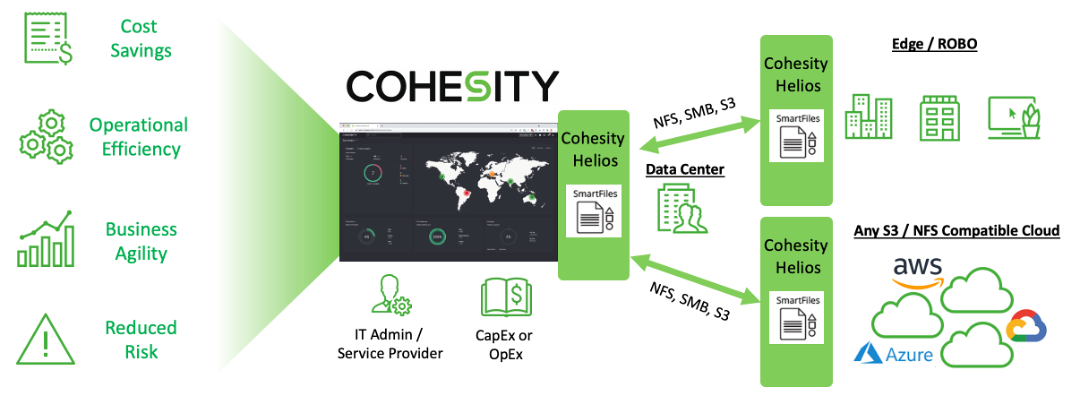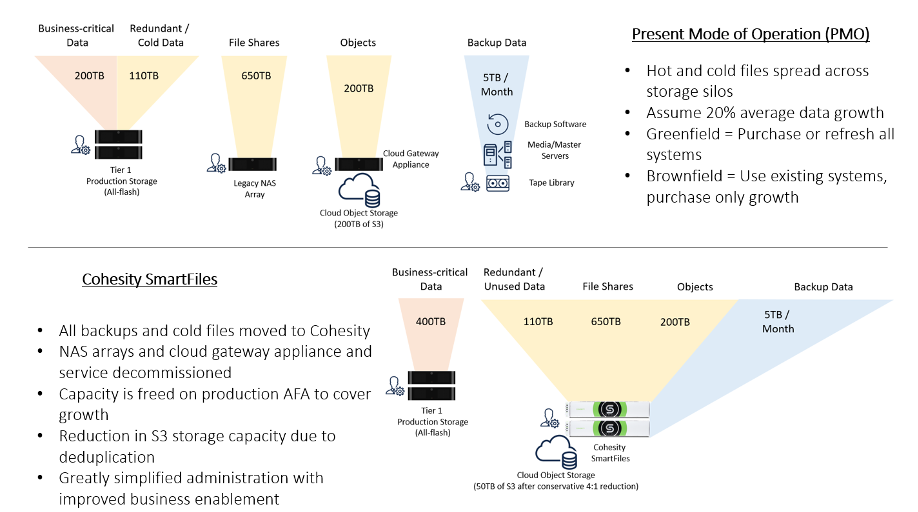
Brought to you by:
Enterprise Strategy Group | Getting to the Bigger Truth™
ESG ECONOMIC VALIDATION
The Economic Benefits of Managing Unstructured Data with Cohesity SmartFiles
By Aviv Kaufmann, Senior ESG Validation Analyst
FEBRUARY 2022
Executive Summary

Introduction
Challenges
Figure 1. Top Ten Most Important Considerations in Justifying IT Investments Over the Next 12 Months
Which of the following considerations do you believe will be most important in justifying IT investments to your organization’s business management team over the next 12 months? (Percent of respondents, N=706, five responses accepted)
Source: Enterprise Strategy Group
The Solution: Cohesity SmartFiles
Figure 2. Cohesity SmartFiles from Edge to Cloud

Figure 3. Cohesity Marketplace Apps

ESG Economic Validation
Cohesity SmartFiles Economic Overview
Cost Savings
“Our storage costs dropped by more than 70% after we implemented Cohesity SmartFiles to manage data lifecycles.”
Improved Operational Efficiency
“With Cohesity SmartFiles, we gained full visibility into our data as well as frequency of acquisition so we could efficiently move cold files to lower-tier storage while appearing to still be on top tier.”
“The visibility and insight that we got from Cohesity allowed us to identify and educate users about the data and then take action to contain sprawl.”
Improved Business Agility/Reduced Risk
“Files that used to take us half a day to find and recover for business users now take only five minutes with SmartFiles.”
“SmartFiles has been a big part of our success. We had questions on how we were going to move things off of our legacy devices. Cohesity provided the migration path and made it very easy to pivot.”
“Ransomware incidents used to take us two to three weeks to find and remedy. With Cohesity, we are protected in advance and can now identify, purge, and restore in less than two hours, which includes all of the time to work with the end-user.”
ESG Analysis
Why This Matters
Figure 4. Scenarios Compared in ESG’s Analysis

© 2022 TechTarget, Inc. All Rights Reserved.
Figure 5. Cohesity SmartFiles Five-year TCO Model
Which of the following considerations do you believe will be most important in justifying IT investments to your organization’s business management team over the next 12 months? (Percent of respondents, N=706, five responses accepted)
Source: Enterprise Strategy Group
- 10% Lower upfront cost of storage, software, and appliances.
- 75% Lower Cost of power/cooling/floorspace through storage consolidation and reduction in footprint.
- 76% Reduction in cloud spend (reducing S3 storage capacity and eliminating cloud gateway service).
- 45% Lower cost of support and maintenance with fewer contracts to manage.
- 61% Reduction in cost of administration through consolidation, improved visibility, and functionality.
Figure 6. Cohesity ROI

Source: Enterprise Strategy Group
Issues to Consider
The Bigger Truth
This ESG Economic Validation was commissioned by Cohesity and is distributed under license from ESG.
All trademark names are property of their respective companies. Information contained in this publication has been obtained by sources The Enterprise Strategy Group (ESG) considers to be reliable but is not warranted by ESG. This publication may contain opinions of ESG, which are subject to change from time to time. This publication is copyrighted by The Enterprise Strategy Group, Inc. Any reproduction or redistribution of this publication, in whole or in part, whether in hard-copy format, electronically, or otherwise to persons not authorized to receive it, without the express consent of The Enterprise Strategy Group, Inc., is in violation of U.S. copyright law and will be subject to an action for civil damages and, if applicable, criminal prosecution. Should you have any questions, please contact ESG Client Relations at 508.482.0188.

Enterprise Strategy Group | Getting to the Bigger Truth™
Enterprise Strategy Group is an IT analyst, research, validation, and strategy firm that provides market intelligence and actionable insight to the global IT community.
